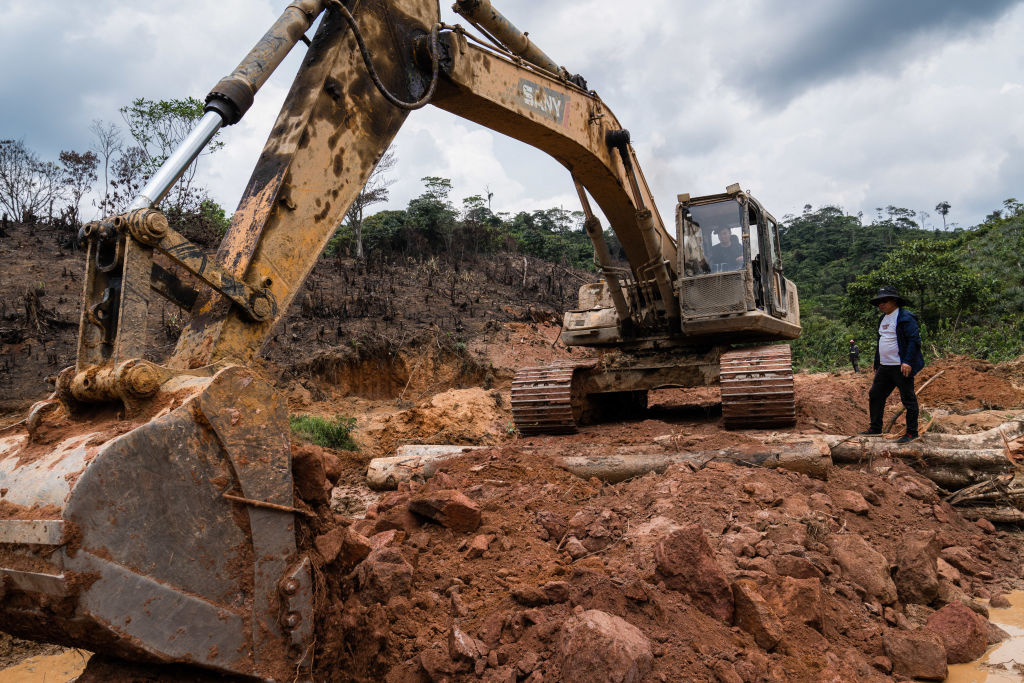In the northeastern corner of the Democratic Republic of the Congo, Chinese mining companies are exploiting government corruption, driving local people from their land, and doing irreparable environmental damage in their pursuit of gold.
Illegal gold mining in the Haut-Uélé province has surged since 2020. In many cases, operations that portray themselves as artisanal mining cooperatives are either backed by Chinese companies or directly operated by them, according to an investigation by Pax for Peace, a nongovernmental organization based in The Netherlands.
“The cooperatives are just labels,” one unidentified official in the Watsa community told Pax. “The Chinese nationals are the ones who do everything.”
For two decades, China’s state-owned mining companies have held a near-monopoly over mining in the DRC. That dominance has allowed Chinese companies to operate with near impunity as they drive corruption, displace communities, and promote illicit mining, according to analyst Ashley Nunes.
“Meanwhile, local populations struggle to maintain access to a stable income and basic services,” Nunes wrote recently for New Lines Institute.
Pax researchers visited mining sites in Haut-Uélé and spoke extensively with residents who have had their lives and livelihoods upended by the Chinese mines. They describe deepening poverty in a region already suffering from economic hardship despite the wealth lying beneath its soil. One woman told investigators that she arrived at her cassava field near the community of Moku to discover mining equipment in the process of destroying her crops.
“I begged them to let me have back even just the cassava that had been ripped up, but they refused,” the woman, a mother of eight, told Pax. “They destroyed most of the field and left a small part, which I’m now trying to use to get by so that the children can survive.”
Chinese companies have flouted laws designed to keep machinery out of areas specifically reserved for artisanal mining. They have also conducted mining operations in areas where it is banned entirely, according to Pax investigators. Similar illegal Chinese mining operations are in place in Ituri, South Kivu and Tshopo provinces. In those areas, some mining companies are working within the law, but many are not.
“While the actors involved in this illegal gold rush in Haut-Uélé have likely made enormous profits, neither the local communities nor the Congolese public treasury have benefited from these activities, which have largely evaded official oversight and taxation,” investigators wrote in their report.
After mining companies move on, artisanal miners are left to sift the destroyed earth for whatever scraps of gold they can find.
Residents say Chinese mining companies, when presented with legal obstacles, get around them by appealing to local or regional officials. Since 2020, hundreds of military and police officers have been deployed to protect the illicit mining operations, according to Pax.
The destruction of freshwater sources and arable land has increased tension across communities and raised the potential for violence in the region. In recent years, gunmen have attacked mining operations near Moku, killing Chinese miners and Congolese Soldiers and stealing gold.
Members of the Mbuti ethnic group are among the people most affected by the Chinese mining actions. The destruction of forests and rivers in the region has left residents without reliable sources of clean water. Water-filled pits left behind by mining companies create potential hazards for locals, particularly children who have drowned in them.
One Mbuti man told investigators: “Our ancestors told us to protect the river, and we followed in their footsteps. Unfortunately, today, [Chinese miners] have come to destroy it.”

